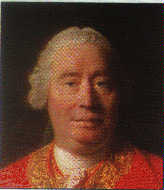







![]()
The Modern Philosophy Graduate Seminar examines significant figures of 17th- and 18th-century philosophy, with emphasis on a careful examination of texts. Although the seminar provides a general overview of philosophic issues of the period, it also focuses on a particular theme. This year's theme centers on a topic of special concern for early modern thinkers: namely, how can human beings be free even though God knows, in creating them, that they will sin?
Text: Philosophical Classics: Modern Philosophy (3rd ed.,
1999) ed. Walter Kaufmann and Forrest Baird.
| Jan. 19 | Introduction | |
| Jan. 24 | Descartes: method, self | 11-30 |
| Jan. 26 | Descartes: God, truth | 30-42 |
| Jan. 31 | Descartes: body-mind | 42-59 |
| Feb. 2 | Hobbes: metaphysics | 60-79 |
| Feb. 7 | Hobbes: political theory | 80-101 |
| Feb. 9 | Malebranche: God, freedom | handout |
| Feb. 14 | Spinoza: metaphysics | 115-33 |
| Feb. 16 | Spinoza: freedom | 133-50 |
| Feb. 21 | Spinoza: mind | 150-68 |
| Feb. 23 | Locke: ideas, freedom | 169-203 |
| Feb. 28 | Locke: identity, knowledge, God, political theory | 204-41 |
| Mar. 1 | Leibniz: metaphysics | 242-57 |
| Mar. 6 | Leibniz: God, theodicy | 257-79 |
| Mar. 8 | Leibniz: monadology | 280-88 |
| Mar. 20 | Berkeley: abstract ideas | 289 - 305 §15 |
| Mar. 22 | Berkeley: minds, God | 305 §16 - 325 §96 |
| Mar. 27 | Berkeley: space-time | 325 §97 - 341 |
| Mar. 29 | Hume: epistemology | 342-71 |
| Apr. 3 | Hume: causality, liberty | 371-94 |
| Apr. 5 | Hume: miracles, providence | 394-421 |
| Apr. 10 | Hume: God as cause | 421-47 |
| Apr. 12 | Hume: God and evil | 447-75 |
| Apr. 17 | Kant: critique of reason | 487-516 |
| Apr. 19 | Kant: logic & self-consciousness | 516-32, 558-71 |
| Apr. 24 | Kant: self, world, God | 571-602 |
| Apr. 26 | Kant: moral law & will | 603-25 |
| May 1 | Kant: freedom & morality | 626-46 |
| May 10 (Wednesday) | Term paper due in office, 5:00 p.m. |
Office: Bolton 302 B
Office hours: Monday 1:45-5:30, Wednesday 1:45-3:45
Phone: 845-5619 (office), 846-4649 (home)
Email: sdaniel@unix.tamu.edu
Website: http://people.tamu.edu/~sdaniel/616sy00.html
Seminar Theme
Although some of the readings might not seem to deal with metaphysical or epistemological questions relating to divine creation and human freedom, in fact all of the readings have bearing on the issue. The point of the seminar is to examine how thinkers explain the ways in which human beings can be identified as objects of God's creation and continued support (or "concurrence") and still be considered morally and politically free.
Assignments/Presentations/Papers/Grades
There are 27 classes devoted to readings from the text. At most class meetings one of the members of the seminar will be charged with selecting passages from the text and other writings by the philosopher that throw light on the seminar theme. Depending on the size of the seminar group, this should mean that each student will be in charge of preparing a handout sheet of such quotes and leading the discussion twice during the semester. These presentations count for 30% of the semester grade.
By mid-semester each student will also be responsible for completing a 10-page paper on the theme of freedom and divine creation or concurrence as addressed by one of the philosophers studied (another 30% of the final grade). The final term paper will be a more in-depth (20-page) paper on the topic dealing with a different philosopher than the one addressed in the short paper. For this paper, most students end up writing on a figure for whom they have prepared a presentation, but it is not required that the selected thinker be one that we will have studied in class. For example, if you want to write on human freedom and divine creation in Bacon, Pascal, Bayle, Vico, Condillac, Diderot, Rousseau, Herder, or any other significant thinker of the era, that is OK as long as you check with me first. The final paper is worth 40% of the final grade.

 Send Dr. Daniel a message: sdaniel@unix.tamu.edu
Send Dr. Daniel a message: sdaniel@unix.tamu.edu

 Go to the Texas A&M Philosophy Home Page
Go to the Texas A&M Philosophy Home Page